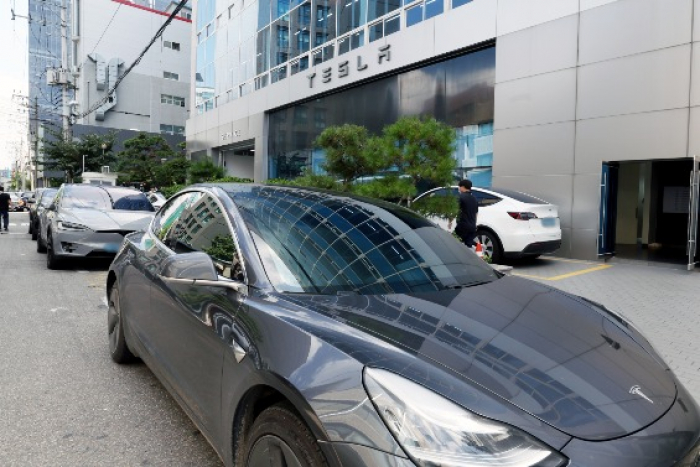Electric vehicles
Korea targets Tesla, imported EVs with new subsidy policy
From 2023, the government will offer EV subsidies based on the level of after-sales service infrastructure
By Aug 24, 2022 (Gmt+09:00)
3
Min read
Most Read
LG Chem to sell water filter business to Glenwood PE for $692 million


KT&G eyes overseas M&A after rejecting activist fund's offer


Kyobo Life poised to buy Japan’s SBI Group-owned savings bank


StockX in merger talks with Naver’s online reseller Kream


Meritz backs half of ex-manager’s $210 mn hedge fund



South Korea is planning to set up a new subsidy policy for electric vehicle purchases, which will be commensurate to the EV makers’ after-sales service level in the Korean market. Some foreign EV makers, especially Tesla Inc., are expected to lose some price competitiveness after the policy takes effect as they will receive fewer subsidies than their Korean rivals.
The Korean government has provided subsidies for EV purchases since 2018, commensurate to the vehicle’s battery capacity and mileage.
Later this week, the government will review how to reflect EV makers’ after-sales service infrastructure level, such as the number of service centers and employees and the workers’ depth of knowledge and training, to the new subsidy standard for EV buyers.
Details of the new policy standards will be announced at the end of this year after research and discussion, according to government sources.
Under the new criteria, the government will raise the number of subsidized EV units by 20-30% in 2023, compared with 2022, and reduce the average subsidy amount per car instead.
The new regulation is understood as a countermeasure to the US Inflation Reduction Act (IRA), which is facing criticism that it favors EVs made in North America. The countermeasure is expected to benefit domestic EV makers as they have better after-sales service infrastructure in Korea than their foreign rivals do.
NEW SUBSIDY POLICY TARGETS TESLA
Tesla Inc. and other US EV makers have been enjoying strong sales in Korea thanks to government subsidies.
According to the Korea Automobile Manufacturers Association (KAMA), the Korean government provided a total of 82.3 billion won ($61.5 million) in subsidies to imported EVs in the first half of 2022. Tesla was the top beneficiary, receiving 44.2 billion won in subsidies for its 6,746 vehicles sold in Korea.
Now, Korea’s new measure is targeting Tesla as the EV giant has fewer after-sales service centers in the country than its peers.
Hyundai Motor Company offers EV repair services at around 370 centers across Korea, boasting the largest number of such centers as of Aug. 23. Kia Corp. provides the services at 279 centers, followed by Renault Korea Motors Inc.’s 192 and GM Korea Company’s 100.
Overseas EV makers operate far fewer service centers in Korea. Tesla, which ranks third in terms of cumulative registered EV units in Korea, manages only nine service centers. Mercedes-Benz operates 56, followed by BMW’s 34, Volvo’s 32 and Audi’s 21.
Given the large number of foreign registered cars in Korea, foreign EV makers need to handle a lot of cars at their service centers.
Tesla has a cumulative 39,584 EV units registered in Korea – which means one center handles 4,398 units on average. Mercedes-Benz has a cumulative 3,350 EV units in the country, thus one center offers services to 60 units on average.
COUNTERMEASURE TO US INFLATION REDUCTION ACT
The Korean government said the new subsidy policy will improve the after-sales service infrastructure in the EV industry.
“The existing subsidy system has been criticized as it doesn’t consider service quality, which some overseas carmakers lack,” said a Ministry of Environment official.
The EV industry sees the new subsidy regulation will be a countermeasure to the US' IRA. The act, which took effect on Aug. 16, contains provisions for the US to allow tax credits for EVs that use batteries made in North America with minerals mined or components made in the region.
Accordingly, Korean EVs such as IONIQ 5 and EV6 won’t qualify for the US tax credits, resulting in losing price competitiveness in the US market.
While some people support Korea’s new policy to boost domestically produced EVs, some government officials say the country needs to be careful as it may spark trade conflict with the US and retaliation against the Korean auto industry.
There have been no EV subsidy policies based on after-sales service infrastructure in the world’s car industry, The Korea Economic Daily understood.
“We are open to all the possible actions and will carefully review the potential issues on the new subsidy standard,” said an official at the Ministry of Environment.
Write to So-Hyeon Kim and Hyung-Kyu Kim at alpha@hankyung.com
Jihyun Kim edited this article.
More to Read
-
 Electric vehiclesKorea may file complaint with WTO against US' Inflation Reduction Act
Electric vehiclesKorea may file complaint with WTO against US' Inflation Reduction ActAug 22, 2022 (Gmt+09:00)
3 Min read -
 Electric vehiclesTesla sweeps local EV subsidies as Korean firms at disadvantage in US
Electric vehiclesTesla sweeps local EV subsidies as Korean firms at disadvantage in USAug 22, 2022 (Gmt+09:00)
3 Min read -
 Electric vehiclesHyundai IONIQ 5: Car and Driver’s EV of the Year
Electric vehiclesHyundai IONIQ 5: Car and Driver’s EV of the YearAug 19, 2022 (Gmt+09:00)
2 Min read -
 Electric vehiclesSeoul says US tax credit bill risks violation of FTA, WTO
Electric vehiclesSeoul says US tax credit bill risks violation of FTA, WTOAug 12, 2022 (Gmt+09:00)
2 Min read -
 Electric vehiclesSK seeks to build EV charger plant in US on subsidies
Electric vehiclesSK seeks to build EV charger plant in US on subsidiesAug 11, 2022 (Gmt+09:00)
3 Min read
Comment 0
LOG IN


